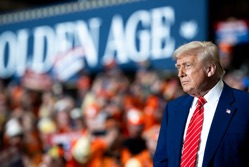Make-or-Break Decision Coming: President Trump's Tariffs on Trial
Daniel McCarthy-Commentary : Nov 4, 2025
PJ Media
If the president doesn't have freedom to respond to the big picture—and to draw it—then no part of government, not Congress and certainly not the judiciary, will have the capacity to act on the scale needed to give our nation a unified direction in global contests.
 BCN Editor's Note: Please be praying for the US Supreme Court to have wisdom and make the right decision in this case for our country, and the world. All of the good that President Trump has accomplished through his tariff strategy could be undone with "devastating" effects, not just in America, but globally. No doubt there is great pressure on each of our Supreme Court justices, please also join me in praying for their protection. -Aimee Herd, Breaking Christian News (Image: Official White House Photo by Daniel Torok-Government Work-Public)
BCN Editor's Note: Please be praying for the US Supreme Court to have wisdom and make the right decision in this case for our country, and the world. All of the good that President Trump has accomplished through his tariff strategy could be undone with "devastating" effects, not just in America, but globally. No doubt there is great pressure on each of our Supreme Court justices, please also join me in praying for their protection. -Aimee Herd, Breaking Christian News (Image: Official White House Photo by Daniel Torok-Government Work-Public)
[PJMedia.com] In times of national emergency, should the Supreme Court dictate America's grand strategy and international economic policies?
This question confronts the justices this week inLearning Resources v. Trump, a case that puts the president's tariff powers to the test.
If President Donald Trump loses, the Treasury faces having to refund more than $100 billion in tariff revenue, and the president's trade strategy will be thrown into chaos.
Businesses that have already changed their operations because of the tariffs, drawing jobs and supply chains back to America, will be subject to grave new uncertainties: Will Trump find other legal grounds for his tariffs or will his project collapse, throwing the country back to an era of unfettered globalization?
The law Trump relies on most for his tariffs is the International Emergency Economic Powers Act, or IEEP, which gives him broad powers to "regulate" international trade when the president declares an emergency.
Trump has declared both the trade deficit and the fentanyl crisis to be emergencies under IEEP.
But critics argue the legislation doesn't authorize tariffs—tariffs are taxes, they say, and the Constitution only gives Congress power to tax.
Yet obviously it's the president who collects taxes, and by giving the president emergency economic powers to deal with international problems, Congress may logically have given the president power to collect tariffs at whatever rate he deems necessary.
The law allows the president to go so far as to suspend trade with a foreign country and impose crippling economic sanctions at his discretion.
If a president can do that much under IEEP, he must be able to take the less drastic step of regulating trade through penalties—tariffs—on foreign producers.
 If the Supreme Court accepts that line of argument, however, it still leaves the question of whether the country is indeed in an emergency. (Image: Pixabay)
If the Supreme Court accepts that line of argument, however, it still leaves the question of whether the country is indeed in an emergency. (Image: Pixabay)
We've had trade deficits since about 1970, consistently; what makes today's any different?
What's changed is they've reached critical mass, not only in Trump's determination but in the opinion of the American public, which elected the "tariff man" last year knowing exactly what he planned to do about industrial decline.
The IEEP lets the president—not the courts—make the call about emergencies emanating from abroad.
To rule IEEP itself is unconstitutional would be a breathtaking intervention by the Supreme Court, seizing power not only from the president but from Congress itself.
Determining the scope of emergency action is something the American people must have a say about, which makes this a matter for the elected branches of government.
If voters don't like how presidents use emergency powers under IEEP, they can elect a Congress that will change the law.
Two branches have to cooperate to give the president this power, and the people... Subscribe for free to Breaking Christian News here
Continue reading Here.
